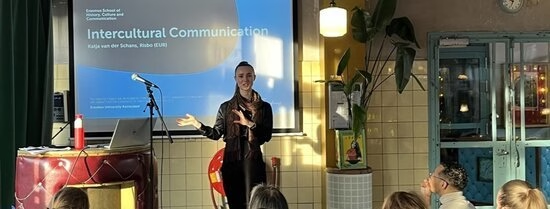"Language proficiency can be seen as a barrier, or a strength. My multilingualism is part of me wherever I go, and it's really a connecting factor." Katja van der Schans is researcher at Risbo and she is, like most people at Risbo, always interested in building bridges between science, education and society. She speaks no less than 7 languages and has a keen interest in everything related to inclusion and diversity. This naturally comes together in her training sessions and workshops on behalf of Risbo in the field of intercultural communication.
Katja, where did this interest in language actually start? Glowing: "Way back as a child, whilst ordering croissants at the campsite in France. Later it only became easier because I had French playmates, and even more when I got a French boyfriend at the age of fifteen." Thus the foundation was laid for a warm memory, a positive experience she gained through, or perhaps thanks to, another language. "In my free time I like to study the relationship between emotions, language, memory and associations. In my research work, I recognize a lot of these insights. Time and again it is confirmed how essential language and fluency is."
Risbo is closely involved in the Sirius network on migrant education, which consists of various, international partners who jointly conduct research and exchange knowledge on various aspects of migrant education in Europe. At Sirius, but also in other Risbo studies, for example on the position of children of EU labor migrants (commissioned by the Ministry of Social Affairs and Employment, ed.), Katja is regularly involved for the focus placed on education within such research.
Katja explains: "We do all kinds of research on different levels of education, but fundamentally, it obviously starts with where your cradle was, and consequently how you ended up in the Dutch education system. In our education system, there used to be a Dutch only policy, and that non-Dutch-speaking children also had to practice Dutch at home. We know through scientific research that this is really not ok. Language is very strongly linked to identity, and if you ban it, it is very drastic and stressful, especially for children. Schools need to be more intentional and inclusive with language. Especially for children's willingness to learn and their cognitive processing, it can be better to be able and be allowed to discuss things in their own language, for example."
“Connecting is one of the most important things in life to me. And language proficiency helps."
For a polyglot like Katja, language is not a barrier, but a powerful tool to connect. "Connection for me is one of the most important things there are in life. And language proficiency helps with that. I once had a Polish student in one of my trainings and I thanked her in Polish, after the training. She was truly touched: it was the first time she had been addressed in her native language here, and that emoted her - and me, too." I ask Katja why. "That I could do that for her, that I had put her at ease in that simple way, was very special," Katja reflects.
She uses it as an example of how to build a bridge, and what the use of language can mean on a societal level. "Look at the current divisions in society and the different groups that are living almost separated from regular lifde, both practically and emotionally. I think many of those people have felt that they don't belong from an early start, and therefore have become defensive. As a result, people tend to seek out their own group and no longer connect. This in turn provokes a defensive reaction from the community. If you want to build a bridge and make people feel understood, start with language. That creates goodwill, encourages contact and active participation and can really help between institutions and citizens, and build up social cohesion in general."
"We live in a diverse society, and I choose to turn that into something positive"
Katja argues fervently about this topic, and doesn't stop talking about it. I ask her to what extent this stems from how she was raised and educated. With two parents who studied pedagogy, it seems perfectly logical that her personal and professional interests developed in the way they did. "You know, I was making friends from a very young age, no matter what language we shared or didn't share. And I still do. For many people, the unknown is scary and often leads to negative energy. You want to avoid that, right? For me, the opportunity to connect with new people and make them feel welcome is such a wealth! We live in a diverse society, and I choose to turn that into something positive."
- More information
Risbo's intercultural communication workshop focuses on reflecting on personal and cultural norms, values, and assumptions, understanding intercultural competences, and practising intercultural communication. In the first part of the workshop, participants explore intercultural communication from different scientific perspectives and reflect on their own cultural background, norms, values and assumptions.
The workshop is available upon request and will be customized per context. For more information, please send an email to training@risbo.eur.nl

